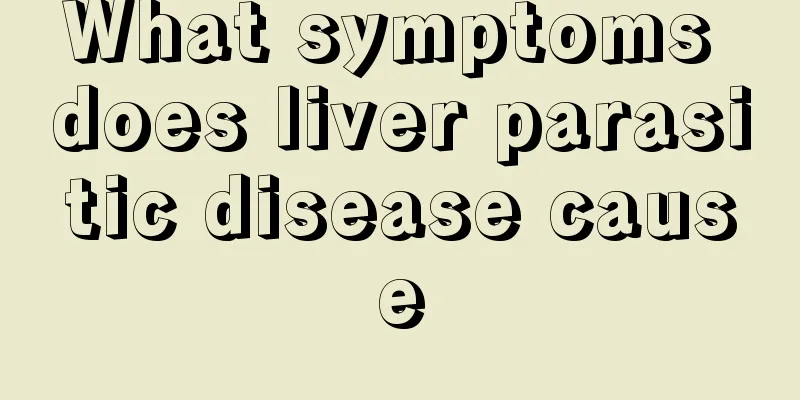What symptoms does liver parasitic disease cause

|
Parasites have always been with us, but sometimes they are not so active. However, due to some living habits of people, parasites can become rampant. If you like to keep pets in your life but don’t pay attention to their hygiene, it will cause some parasitic diseases. In terms of diet, it is related to liking to eat raw food or not cooking the food. Liver parasites can only be discovered through examination, so when some symptoms appear in the body, you must pay attention. 1. Hepatitis-like reaction Acute cases may cause fever, abdominal pain, urticaria, and liver enlargement. These are the symptoms caused by Fasciola hepatica, which are generally divided into 4 stages. The acute phase may cause fever, abdominal pain, flatulence, vomiting, diarrhea, or constipation. Gastrointestinal discomfort occurs during the latent period, but it is not obvious. The chronic stage causes fatigue, right upper quadrant pain, nausea, anorexia, anemia, and jaundice. Ectopic damage means that the parasites appear outside the liver and can even flow through the blood to the lungs, stomach, eye sockets and other parts. If you have the habit of eating raw beef or mutton, this parasite will also appear in the throat. 2. Cholecystitis Sinensis fluke can cause reactions similar to cholecystitis and cholangitis. Severe infections can manifest as allergies, gastrointestinal discomfort, abdominal distension, loss of appetite, weakness in the limbs, and aversion to greasy food. S. sinensis likes to parasitize in humans and carnivorous mammals. The first host is snails, the second host is fish and shrimp, and finally it parasitizes humans, cats, dogs, etc. Therefore, eating sashimi, fish sashimi, fish sushi, or incompletely heating seafood may cause parasites to enter the body. 3. Pain in the liver area accompanied by shortness of breath Echinococcus granulosus may appear in many places in the human body, but most often in the liver. Mild pain will occur in the infected area, and shortness of breath and chest pain will occur in the lungs. It is easily accompanied by urticaria, poisoning, gastrointestinal dysfunction, weight loss, etc. The final host of Echinococcus granulosus is carnivores such as dogs. If humans accidentally eat the eggs, they are also prone to infection. Therefore, the chances of pets at home getting parasitic infections are higher than for ordinary people. And it is easy to develop into echinococcosis. |
<<: What are the symptoms of unilateral chin loss
>>: What are the differences between cold and dampness and damp heat symptoms
Recommend
What are the benefits of sweating in summer?
Sweating is a very common phenomenon. If you do s...
Why do you get breast cancer? The most important thing to prevent breast cancer is to go to the hospital for a check-up
Why do you get breast cancer? Studies have shown ...
What causes excessive tongue coating and what are the symptoms?
Normally the tongue coating is thin. If there is ...
What are the symptoms of advanced gastric cancer? Is advanced gastric cancer harmful?
Advanced gastric cancer mainly refers to the phen...
Low cardiac troponin
Many people don’t know what cardiac troponin is. ...
Why is the urethra itchy? The reason for male urethral pain is actually like this
Urethral itching is a condition that many men and...
How to make taro balls, red beans and sago
Among many delicious snacks, red bean, taro balls...
How does TCM treat lung cancer? Three major principles of TCM treatment of lung cancer
What are the three major principles of TCM treatm...
What should I do if I have acute mumps?
We often encounter some common diseases in our li...
What are the clinical manifestations of lung cancer? Three symptoms suggest the occurrence of lung cancer
The lungs are the human body's respiratory or...
How long does it take for a distal clavicle fracture to heal
After a clavicle fracture, you are not allowed to...
Preventive measures for ovarian tumors
In today's society, women have been liberated...
Will I get fat if I drink soup every day?
People in the south have the habit of drinking so...
What are the early symptoms of liver cancer in women?
What are the early symptoms of liver cancer in wo...
Farts are mostly symptoms of stomach cancer
Farts are mostly symptoms of stomach cancer: Whet...









